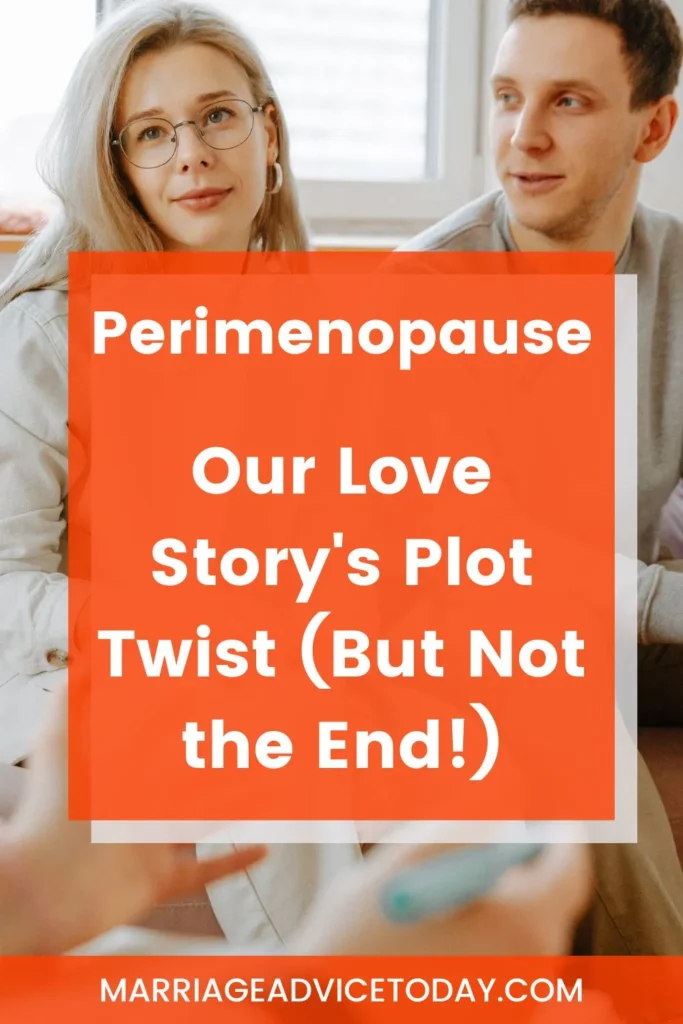Perimenopause Has Been a Bitch On My Marriage
Perimenopause snuck up on me, wreaking havoc on my hormones, mood, and marriage. Unexpected symptoms like anxiety and memory lapses left me (and my husband) confused and frustrated. But through open communication, a commitment to understanding perimenopause, and a willingness to adapt, we’re navigating this hormonal shift together. This journey may be bumpy, but it doesn’t have to be the end of our love story. If perimenopause (or health issues) feel like they’re ruining your marriage, you might want to read this.
I’d suspected it for some time, but my (then) doctor said I was “too young”. Fast forward a couple years and I became certain I was in perimenopause.
Hormone changes and fluctuations came in to our lives nearly 2 years ago now like a wrecking ball, demolishing our routines and sense of normalcy.
And it hurt!
But perimenopause wasn’t just hurting me… at least not in the physical sense.
No, it was hurting my marriage and my kids, amongst other things.
It didn’t really start out as a destructive beast, but it didn’t take long for things to spiral out of control as I struggled to find a doctor worth a damn to help me control it.
But I think I need to start at the beginning.

What is Perimenopause?
Well, we have a vague notion of what menopause is beyond medical terminology. And people are only recently discussing perimenopause more openly. And yet, both seem so misunderstood and minimized as “just” hot flashes, when the impact on our well-being can be profound.
So let me tell you what I’ve learned thus far in my perimenopause journey.
Perimenopause is, medically, all the hormone shifts and body changes that lead up to the more well-known, menopause (when a woman no longer has a period).
Okay, so that doesn’t sound so bad …
Yeah, except it is! And neither my husband or I were prepared for it.
Symptoms of Perimenopause
While women have a variety of symptoms, the simplistic lists you’ll find on medical sites don’t quite capture the hidden aspects that go beyond the physical, like the impact on relationships, self-esteem, and overall well-being.
My first real perimenopause symptom came in the form of panic attacks that happened in the middle of the night, and several times throughout the day, for a week before I learned how to get them mostly under control. And let me tell you, the first one was a literally rude wakeup call!
I really had no idea perimenopause anxiety was a thing, but apparently it is.
But here are other signs of perimenopause:
- Changes in
- Mood
- Sexual Desire
- Trouble with
- Sleep
- Concentration
- Hot Flashes and Night Sweats
- Vaginal Dryness
- And more
Although it took little time for me to get those pesky anxiety attacks under control, it took a bit more time to resolve other symptoms, and still others are persistent.
I’m currently working with functional medicine to gain more control over the most persistent and troublesome symptoms.
Turns out, my hypothyroidism was impacted further by the onset of perimenopause, so we’ve been working to get that under control as well.
All this to say, the “beginning” was quite the challenge for me and my family as they had to deal with me in all my perimenopause glory.
And as much as watching me suddenly strip off all my clothes might have been exciting for my husband initially, the hot flashes were so tremendous he realized there was nothing to get excited about pretty quickly.
What I’m really finding out is that perimenopause is puberty’s evil sister!!
How Long Does Perimenopause Last?
Just as symptoms of perimenopause are somewhat unique to each woman, so is the length of time an individual will have to deal with them. Some women are lucky enough to be bothered by perimenopause symptoms for a few months. Still others can be dealing with perimenopause for 4 to 10 years!
Perimenopause Caused These Problems for My Marriage (So Far)
Having gotten past the week long anxiety attacks, with a rare one cropping up, my husband stopped feeling bad for me I guess. And now I’m an annoyance.
I don’t blame him though. I’m annoyed with myself!
Here’s how my marriage is impacted by perimenopause:
1. I’m a lot less tolerant
It’s important to note that I’m not the most tolerant of BS in general, however, with the onset of perimenopause, this became more problematic.
Previously, had my husband said something I wasn’t particularly fond of, I’d simply let it slide.
These days, however, I catch myself flipping him the bird or straight up calling him out on his shit. Sometimes it’s well-deserved, sometimes not so much, but still, it upsets the dynamic we’ve had going on in our relationship for nearly 15 years.
Some of it I guess he’ll have to start getting used to, but I do find I need to reel it in because I may overreact at times.
2. We’re having less sex
Between more frequent periods, lower sex drive, and dryness (down there), it’s really hard to get in the mood.
And although I want to be in the mood and have more sex, more often than not, my body fights getting started.
Even if my mind somehow manages to get there, that doesn’t always translate to a similar response in my body.
It’s frustrating for both of us, in different ways, but I’m continuing to put this issue at the forefront of my perimenopause treatment, because I want us to continue being intimate!
3. My mind is shit
I’m not going to lie. I feel the stupidest I’ve ever felt in my life!
I can’t remember anything.
I get confused a lot.
I get sidetracked often.
I simply don’t feel I have space in my brain for everything that needs remembering.
And although studies have concluded that there are brain changes during the transition toward menopause, it’s no less frustrating for me and my family.
My poor husband sometimes feels he has to take on a bit more because I simply forget things and he has to make up for it.
For a while there, I would plan meals and make our weekly grocery list, just to find that I’d forgotten essential items to cook at least one meal a week. So, he’d have to step in and run down the grocery list with me comparing to our recipes to ensure we had everything before grocery shopping.
None of this perimenopause brain fog is fun for any of us, especially as I feel down on myself for my stupidity. And the jokes about it don’t really help … cue #1.
Having read Getting Things Done by David Allen, I implemented some strategies into a full-blown digital productivity app called TickTick that I carry on my phone and have downloaded onto my computer. It’s become my family command center that helps me keep track of appointments, meal planning, work stuff, and more.
It’s not a fool proof system, mainly because there are plenty of times I default to writing a reminder note when I should be plugging my reminder into TickTick. But, I’ve come a long way at getting much more organized!
4. It changes finances
Well, maybe not for everyone.
But, as I’m one to seek a functional medicine approach to dealing with life’s challenges, this increases my spending habits.
I’ve invested in a hormone support program on top of going to a clinic that doesn’t accept insurance, so they can spend the time necessary getting to the root of problems.
As part of the hormone support, I’ve spent some time with a nutritionist to improve my approach to eating and exercise.
And because I wasn’t getting enough protein at breakfast, and feeling the strain of making more meals every day, I decided to “invest” in a smoothie delivery program to save time, while adding protein powder to my morning shakes.
While this all has generally lead to improved mood throughout the day (mostly), it’s still costs we hadn’t previously planned on.
This is on top of the thyroid and progesterone prescriptions.
And let’s not forget that I’m consistently turning the thermostat down at the house to stay cool.
Listen, I’m no expert, but what I can say is that if you can afford some extra luxuries to make this transition a bit less frustrating, do it. But have a chat with the hubby about it so he understands what’s going on.
And hopefully whatever you do implement will show some results to make you both happier.
5. My husband doesn’t really understand (but neither do I)
Well, I can’t really blame him, because I don’t understand everything that’s going on. And it doesn’t help that there seems to be a load of contradictory information flying around the internet and forums.
Doctors have to find what works for you since perimenopause affects individuals differently.
Some doctors recommend HRT while others don’t.
There doesn’t seem to be enough discussion to help men understand this transition in general.
The best advice I can give is that you have sincere conversations with your husband during this transitional phase.
Most of what I learn in my hormone support program I summarize to my husband to try to help him better understand.
But truth be told, most of us all hear stories about how menopause ruins marriages. Who hasn’t heard of at least one couple that divorced because of menopause?
Well, men need a real, stupid easy resource to refer to that can help them understand that the crazy, forgetful, less-than-desirable wife is a challenge for her too. Much of it is out of our control, but practicing listening skills, learning the science behind these changes, and being supportive instead of critical can improve her reactions and experience as well.
That I know of, these kinds of resources just aren’t available.
If you know of a man’s guide to perimenopause for the man who doesn’t read, let us know about it!
6. I think we’re not in love
This one sucks because I know marriage changes over time, and feelings wax and wane. I have achieved much greater expectations than to believe that the passionate love you see in movies isn’t realistic.
BUT, sometimes I feel as though we don’t love each other.
Honestly, sometimes I feel like I don’t love him
And sometimes I feel like he doesn’t love me.
But I also know that I can overthink things, or get in negative cycles, so I do regular check ins with my husband.
Turns out, when estrogen falls, so can oxytocin (the love hormone).
The best thing I can say here is to keep those lines of communication open and check in with your spouse.
Think Your Marriage Is Doomed Because of Perimenopause?
While it’s early in my journey, I’m finding that we’re going through waves where I feel like things are under control, and then others where things aren’t.
But that doesn’t mean perimenopause is going to ruin my marriage. That’s kind of up to me and the Mister.
What I can say is that you both need to recognize the following:
#1 – sometimes the bat-shit-crazy is not really controllable, and you’ll have to accept it on some level.
#2 – each of you need to spend some kind of time trying to understand the science behind the symptoms.
#3 – it would be beneficial to communicate with each other and come together to determine how best to support the perimenopause transition.
#4 – giving yourself (or your partner) grace and empathy is essential.
#5 – find regular ways to express love and gratitude for each other, even when it’s hard.
#6 – don’t assume your marriage will be ruined. That’s a choice, not a fact.
But here’s the thing, ladies & gents: perimenopause doesn’t have to be the villain in your love story. It can be a plot twist, sure, one that throws a wrench into your routine and tests your patience. But with open communication, a willingness to learn, and a boatload of empathy for yourselves and your partners, you can rewrite the ending.
Remember, even the strongest relationships go through rough patches. This is just another chapter, and together, you can write a happy one.
That’s what I’ll be trying to do!!


